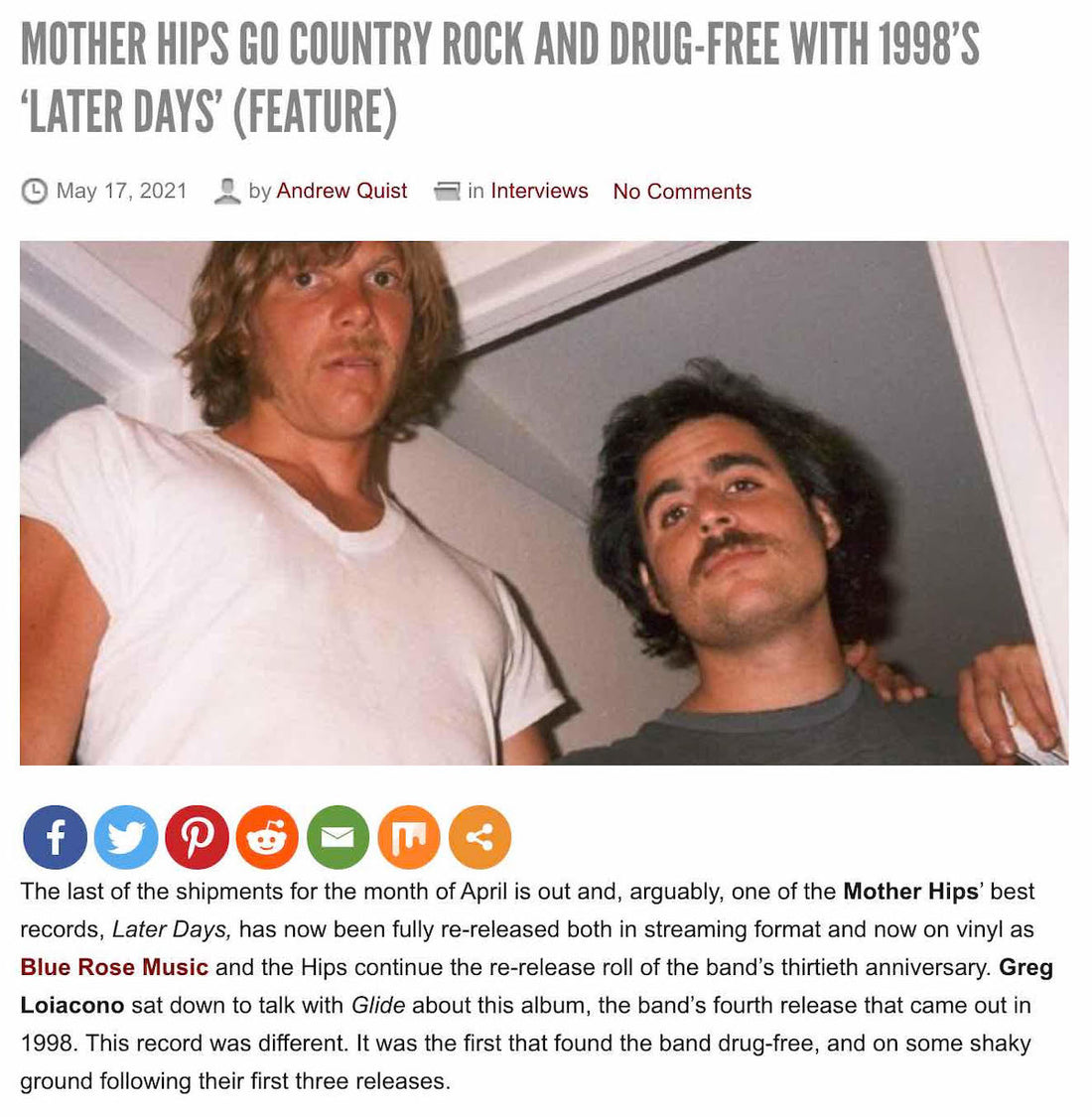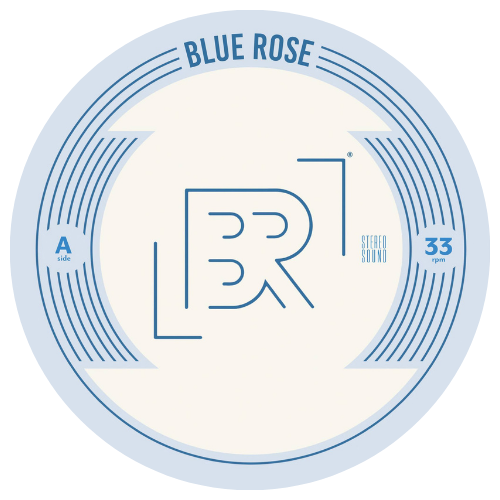
Glide Magazine: MOTHER HIPS GO COUNTRY ROCK AND DRUG-FREE WITH 1998’S ‘LATER DAYS’ (FEATURE)
Share
The last of the shipments for the month of April is out and, arguably, one of the Mother Hips’ best records, Later Days, has now been fully re-released both in streaming format and now on vinyl as Blue Rose Music and the Hips continue the re-release roll of the band’s thirtieth anniversary. Greg Loiacono sat down to talk with Glide about this album, the band’s fourth release that came out in 1998. This record was different. It was the first that found the band drug-free, and on some shaky ground following their first three releases.
Hard drugs had been in the Hips’ scene for the first few years of their existence and, like so many other bands, those drugs began to take precedence over the music, over relationships, and there was clearly a downward spiral on the horizon. So the guys took it upon themselves to go get clean and shake things up musically. The Country rock sound had always been present in the band’s repertoire with covers like “Whiskey On A Southbound, “Whiskey River,” and “Working Man Blues” among others but this was not a genre nearly as represented as the band’s psychedelic side. As change swept in, however, the Hips leaned into the Country rock thing harder. It was a shift away from the confusion of psychedelia to something more rooted and grounded which was something they might not have known they needed but did. It was from this soup that Later Days emerged.
For Loioacono, drugs had been a part of his life since he was a teen.
“Speaking for myself, the presence of drugs was always there for me. Since the time I was 14 or 15, I was always reaching outside of myself for something else. If there wasn’t weed or booze when I was hanging out, then I was always thinking, ‘Where was it?’ It was always the thing that needed to be there to make the party happen. Eventually, the bell rung when I tried heroin for the first time and I thought, ‘Oh, okay, there’s the thing that’s going to make me feel the best.’‘ As the band recorded and toured the last of their three albums, Shootout, it became increasingly clear that the whole drug thing was simply not sustainable and the band needed to clean up.
By that time, relationships within the band were strained. Trust between original drummer Mike Wofchuck and the other three members (Loiacono, Tim Bluhm and bassist Isaac Parsons) had significantly eroded.
“The damage had been done as far as our using (drugs). A lot of our trust was blown and Mike was scared,” says Loiacono. “Wofchuck was not believing that we were going to stop using. I think the easiest way to sum it up is different mindsets and different directions. The idea of moving in a new direction had been brewing for a while and there were some differences musically. We were listening to country rock and Mike was listening to a lot more of the jamband music. There’s so much I miss about Mike and not only as a player but as a friend. He’s a great guy, great musician in general. He paid attention to the songs and he’s still out there making music,” says Loioacono.
The whole, “Are the Mother Hips a jamband?” question has always been a part of the band’s existence. It’s a valid question. Some would say they were marketed that way. Prior to Later Days, They were on H.O.R.D.E. tour, playing on bills with Widespread Panic, The Black Crowes, and others that flaunted the jammy ethos. And while the Hips definitely went after some improvisation in their music, they never thought of themselves as a jamband and even railed against the pigeon hole. Perhaps more out of instinct and a subconscious response was that they started focusing in on the country-rock vibe that is such a hallmark of the Later Days period.
With Wofchuck having exited, the band called up John Hofer. Hofer had played with the band Freewheelers who had opened many dates for the Hips around this period and Loiacono and Bluhm were massively impressed with how well he could play country songs.
“John had seen us in our darkest moments when he played with Freewheelers. When we called him, he wasn’t sure why we were calling. He thought maybe one of us had OD’d and he was freaked out. We told him we were three months clean and he was elated, whether he was in the band or not, because he was just waiting to get the call that one of us was dead. But they were calling Hofe to join and, “so when he came into the band, he was already a brother,” describes Loiacono.
With the players assembled and new songs being written, the band had to sit down, drug-free, and create. This newfound sobriety was a dichotomy. There was a lightness felt from being free of addiction but, as Loioacono says, there was also a difficulty.
“When the drugs were gone, there was always the voice inside your head, that “attic voice,” that said, ‘You’re gonna suck, you’re not gonna be able to improv and you’re in an improv band. You’re not gonna be able to write. You wanna start writing and you’re not going to be able to do that.’ So that voice just kept prodding me to get loaded again.” But the band stuck it because, “It was just a time when we made a new decision, we just had to stick it. We cared about the songwriting more, we were becoming better musicians. Later Days is a confident record. Some of Tim’s best songs are on that record like ‘Gold Plated.’ The lyrics on ‘Later Days’ – when I actually read the lyrics to that song now, It’s like, “holy crap!” And ‘Spotless As You,’ that’s a heavy song and initially Tim had it in a waltz time and because of that it was so dark that I wanted to change the time signature to make it a little lighter. There was so much depth to Tim’s writing, he was crushing it. I was finding my own voice too, we had good collaborations on that album like ‘Do It On The Strings,” adds Loiacono.
Add to those standouts the remarkable mid-record combination of “Motorhome” and “Tired Wings” two songs that could play as one, augmented by the piano work of Chris Joyner, these two make up the highlight of the album for many fans.
Perhaps the most impressive, however, was that the album was recorded with a very low budget and without the backing of a label. The band had been dropped from American Recordings in 1996. So there were many unknowns surrounding the sessions themselves. While the record sounds confident, the feeling surrounding the band that recorded it was anything but.
“It was still a little scary. We didn’t have a label, there was fear and heartbreak. We were starting to be an older band having been around for about 8 years. Musically, what was on the horizon was a mystery. We were doing it all on our own and we weren’t making any money. Then all a sudden I have a live-in girlfriend (his now wife of 21 years), personally, there was light because I was out of the darkness of being reliant on drugs, but that contrasted to what was happening in regard to the band. My life outside and inside the Hips were two very different things.” And tack on that, though a brother, they were working with a new drummer who had his own style of recording. The Hips liked to track live in the studio but Hofer liked to do things differently. “John wanted to track on his own and he would kick us out of the studio so he could concentrate so Tim and I just went out and smoked cigarettes by the pool and then he’d kick Isaac out and just track by himself. He could do that. We thought you needed to all play together and he’d just do it from memory,” recalls Loioacono.
As these re-releases roll out, it is interesting for Loiacono to see the response they elicit from fans and fellow musicians.
“It’s cool to see each album come out and people’s responses but Later Days has gotten the most ‘This is my favorite album’ comments and I’ve heard that over the years especially from musicians. Some people didn’t like the live shows and their jamminess and here were the songs in a more refined way. It’s been interesting to see the feedback on this one. Scott Hirsch, for example, a music producer/engineer/mixer thinks it sounds great while he knows how low-fi it was recorded. I go back and look at it critically thinking, ‘I wish we could remix the album because the bass is too loud but . . . that’s the album.’ It does that little nostalgic thing that any photo album or certain pieces of music does to me. There were only a couple things that were really known but this was a period in which we wondered if we would still be in a band at the age of 30 and we were 27.”
What we know now is that these guys did not only continue being musicians well past the age of thirty, but they became a California musical institution – a musical cornerstone of the California sound. The labor of recording, promoting, and releasing Later Days all in-house on their own, while certainly a mountain of work, ultimately paid off as it is considered one of their finest albums in a very healthy discography. What the Mother Hips proved as a unit was that they were not breakable. They were not broken by the power of addiction, they were not broken when their label dropped them and they were not broken by the pressure of having to make a living. This music thing was always what they were going to do, what they HAD to do and now twenty-three years later, we are revisiting the record that would prove to be the base from which they would not only rebuild but excel.
